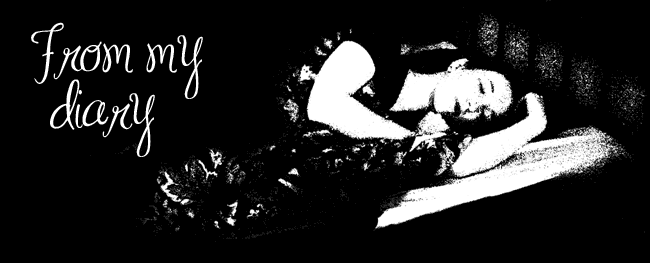I originally
made it in oder to exorcise my irrational feelings of longing
for those few things that had made me stay, but working with
this comic also made me see much more clearly all the things
that had been very, very wrong in that relationship.
This basic "Respect
Checklist" was an eye-opener to me once.
And here is a checklist
of signs that your partner might be abusive. For my previous
relationship, 39 of the 43 statements in the first list were
true. :oD In the 'critical' list, 13 of the 14 statements were
true! (But I was never 'afraid' of him, not even when he was
'joking' and 'pretended' to choke me ...)
For comparison, I know I probably did 11 of the 43 things in the
first list to my ex. Of the 'critical' things definitely one (I
hurt him physically) and very likely a couple more were true for
him, though it's hard for me to guess, since he wouldn't really
talk about his feelings.
Dr. Irene Matiatos also has a very
interesting in-depth article
about "the verbally abusive partner". (Here is a
mirror, if you can't stand ComicSans and find animated
kittens frightening.)
If you find yourself a victim of abuse,
the hardest part to realise could be your own responsibility -
there never seems to be any "black and white"
abuser/victim pattern, but the victim often becomes abusing
towards the abuser, as well.
The responsibility you have is actually
to respect yourself and your partner enough to draw the line and
walk away when you realise you are being abused.
To stay in a relationship where you are
abused will send the wrong signals - it tells the abuser that
his/her behaviour is okay, so he/she will never learn that
he/she is doing something wrong. If you love your partner and
want to help him/her, the only way is to make it clear that you
won't accept any abuse from him/her, and the only way to make it
clear might often be to leave.
¤ ¤ ¤
My ex probably has a lot of issues that
make him afraid of getting 'too close' to people. (In the sense
of: "Emotional closeness is dangerous. A woman
will [inevitably] let you down and [hurt you immensely]. I will
do everything in my power to push my partner away [so she can't
get close enough to hurt me]. Then I will convince everyone,
including myself, that it is her fault", as Dr. Irene
puts it in this article
about a man who successfully overcame this problem.)
But that's his problem, not mine ...
because each person can only fix him/herself.
I have a different problem. It's the
fact that I stayed with him so long even though he wasn't
treating me very well and I was very unhappy during most of the
relationship.
The US Americans, who love defining
everything as 'syndromes', even have a name for that -
"codependency".
As the previously mentioned Dr.
Irene describes it,
"The central concept is that the
codependent individual 'takes it' and 'understands,' despite
feeling hurt. Waiting for brownie points in heaven, or for a
loved one to be magically healed through their persistent love
and care taking, they accept disrespect from others. It does not
occur to the codependent person that it is not OK to 'take it'
and 'put up' no matter what!"
This "codependent" behaviour
is said to be a form of "coping behaviour" that can
appear in children of abusive parents, or in children of parents
who themselves were once children of abusive parents and learned
to become "codependent". The "codependent"
person has never learned that he or she has every right to NOT
put up with any form of abuse, and thinks it's 'okay' to keep
giving love one-sidedly without receiving anything back, and
readily takes any blame for all kinds of problems on
him/herself. The "codependent" person might also never
have learned what a truly respectful and loving relationship can
be like.
In my own case, there has been a lot of
that in my family history, so it doesn't surprise me that I
could become so, too. My mother has always tried to tell me and
my sister that we must not let ourselves go through what she did
in her 26 years with my dad. But it hasn't always been so easy
when I didn't know what was wrong with ... myself!
¤ ¤ ¤
All in all, I stayed two and a half
years in my previous relationship. It happened twice that I made
up my mind to leave, but each time I ended up feeling so sorry
for him that I just couldn't do it. (The second time - which was
prompted by this
incident - the critical moment was when I for some reason
came to think of the Tapio Rautavaara song "Päivänsäde
ja menninkäinen", which made me cry, so I lost control ...
(>_<); Argh ...)
When we eventually broke up, in early
June this year, it was right after I had been away on a
two-month internship abroad. In those two months I had
experienced something completely new compared to what I had
gotten used to - that all my knowledge, interests and skills
were actually very useful and greatly appreciated!
Gradually, I started to realise how
badly my boyfriend was treating me, and made up my mind that it
*definitely* had to end, no matter what. When I came back, I was
happily surprised to hear that he had made up his mind to break
up, as well. So, everything went quite smoothly. (I honestly
don't know how it might have gone if he would have begged me to
stay again ... *shudder*)
When he left for work after we'd
formally broken up, I kept hysterically laughing and crying all
at once for several minutes. I was so relieved ...
¤ ¤ ¤
Tinet Elmgren, November 2006
¤ ¤ ¤
Plenty
more Black Pig Comics!

